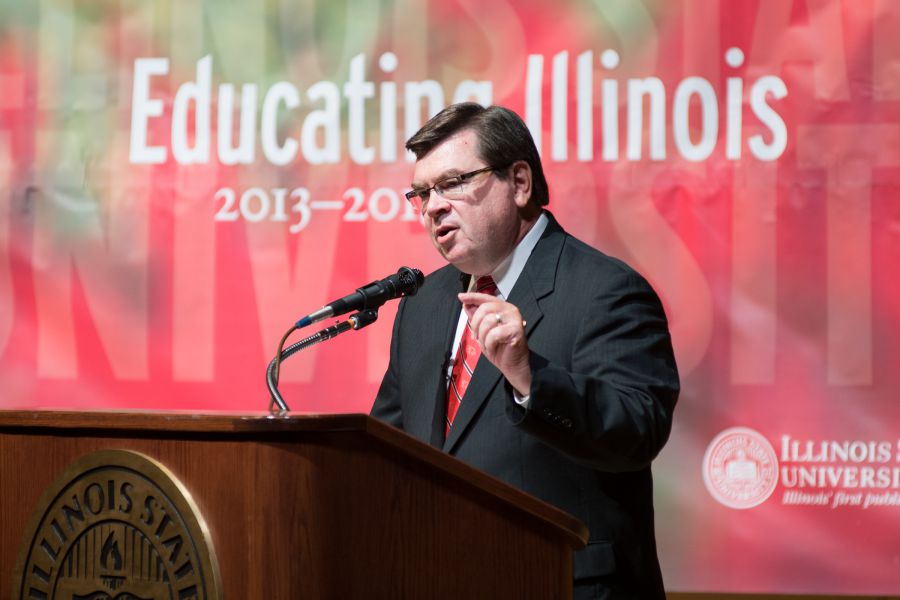In his first State of the University address, Illinois State University President Larry Dietz outlined his priorities for institutional leadership and enhanced campus diversity.
During the September 18 speech, Dietz highlighted Illinois State’s increased enrollment, record fundraising productivity and advancement in national rankings; noteworthy accomplishments in a time of increased competition for prospective students, reduced funding for higher education and a transition in University leadership.
“My tasks are many and my priorities are aligned with the mission, vision and values of our strategic plan, Educating Illinois,” said Dietz, who was appointed president in March. “My first priority will be my focus on stable, high-quality leadership. Right now, Illinois State is in the unique position of having four interim vice presidents. Any interim role is a challenging assignment, but I want you to know that each of our leaders has my full confidence.”
The search process for the vice president for Academic Affairs is currently underway and the search for the vice president for University Advancement will begin later this semester. “I expect these first two searches to be completed, with appointments made, prior to the end of this academic year,” said Dietz.
Search processes for the vice president for Finance and Planning and vice president for Student Affairs will begin in the fall of 2015.
Enhancing diversity among faculty and staff is also a high priority for Dietz. Discussions with campus leaders and new data collection methods will help to assess the climate for diversity on campus and in the community.
“I will place a personal emphasis on attracting administrators from underrepresented groups,” said Dietz. “In addition, I am currently working with the Office of Equal Opportunity, Ethics and Access to bring more diversity to that important office. I will also be working closely with the shared governance committees charged with selecting candidates for our vice presidents and I will place high importance on seeking candidates from diverse backgrounds.”
Diversity among the student body has increased in recent years and Dietz believes there is room for additional growth. Expanded marketing, course availability, financial aid opportunities and retention efforts will help to build on the momentum created by this year’s large freshman class. Efforts will also be made to increase the number of international students coming to Illinois State.
“While we will never deny access to academically motivated in-state students to attend Illinois State, I believe this University has the ability and the capacity for moderate growth and I believe some of that growth can be achieved with students from diverse cultures,” Dietz said. “Illinois State University has a great deal to offer these students. As we answer the charge of our new strategic plan for International Studies, it is time to achieve a more globally reflective student population.”
Dietz also outlined plans for the creation of a Center for Civic Engagement to coordinate campus initiatives that connect students with leadership and community service opportunities. ”The Center for Civic Engagement would also have an outward focus, inviting the collaboration and participation of local and state groups and individuals to join our efforts to produce an educated, active and engaged citizenry,” said Dietz.
Illinois State is in the midst of its 10-year comprehensive review for re-accreditation by the Higher Learning Commission of the North Central Association of Colleges and Schools. Dietz said the accreditation process assures the public, particularly prospective students, that Illinois State meets high standards and is engaged in continuous improvement. Faculty, staff and student work teams have compiled documentation and are finalizing accreditation documents in preparation for a site visit by a Higher Learning Commission peer review team in April of 2015.
“Illinois State is committed to the highest quality education and considers the reaffirmation process an important opportunity for critical self-analysis leading to improvement of our programs and services,” said Dietz.


